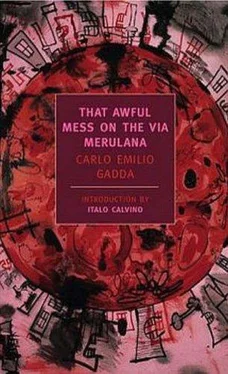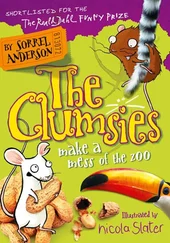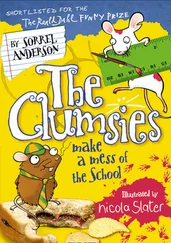The investigations continued on the scene of the crime in the early afternoon: with the main door of the building shut, the door of the apartment shut, with reinforcements of police, with Sergeant Valiani of the scientific office and with the armed intervention of the fingerprint bureau. The tenants and even the concierge herself were asked not to linger on the stairs, "to allow greater freedom of movement to the investigations," and to remain, on the other hand, insofar as possible, "within reach" of the squad. The coroner appeared after five-thirty. The attorney general's office had taken official cognizance of the crime shortly before four, via the various offices, via Doctor Fumi and the chief of police. The good Cristoforo, the variopainted Menegazzi, the little Gina, former artilleryman Bottafavi, and handsome young Doctor Valdarena were heard alternately and simultaneously. But "the crime" remained shrouded in mystery, as the late editions said finally, in a paper which had managed to bring off the scoop, shouting the news along Corso Umberto. The reporters, wangle as they might, couldn't get past the door of the Balduccis. But at the smaller entrance to the building, however, they had caught Sora Elodia, of Stairway B, who, well, was rather jolly, as she usually happened to be, on Thursdays and Sundays. She was making eyes at the policemen, who only laughed in her face.
It was established that none of the building's tenants could furnish clues as to who might have been the author, or authors, of the crime. No one, except the little girl, Maddalena Felicetti, had encountered people on the stairs: not even Valdarena; nobody had seen him, either. He was a Doctor of Economic Science — Ingravallo was well aware of this — and employed by Standard Oil. For some time he had been stationed at Vado Ligure, then in Rome. Now he was preparing to move to Genoa, and also to be married. He was engaged to a Genoa girl, a snappy little brunette, whose photograph he produced: a certain Lantini Renata. Of excellent family, naturally. According to the excellent family, he "was terribly in love," our Doctor Valdarena, Signorino Giuliano. Balducci had spoken about it to Ingravallo, meeting him in Albano at the Cantinone tavern, with some jovial allusion to hot young blood, as well as the chronic lack, which afflicted the young man, of a few sheckels, which ought to stick to his fingers, at least in part; and yet money fluttered through them regularly, like butterflies from the fingers of an Apollo: the Apollos you see in the park, of marble. Balducci had dubbed him a "good-looking boy" (no need for references on this score): "with his degree in economic science," top grades and cum laude, too, but always broke, as is so often the case with those who want to teach others.. how to handle the economy: a little short of the ready. . shorter than a Roman cousin — not to mention a Genoese father-in-law — would have wished. "No, no, he isn't living off of short loans; but you know how it is, at his age, with all the temptations there are around: you understand, a boy like that… if he isn't hard up for money, he can't be very hard up for the other thing." Ingravallo was grim-faced, that evening, in Albano: the rosy-cheeked indulgence and, indeed, the male solidarity of Balducci, the husband, a toothpick between his teeth, to Don Ciccio betrayed too easy a digestion… of the product of Empedocle e Figlio, maybe. That carefree, after-dinner rosyness of the commercial traveler, the hunter with a pair of new boots… by God, it had finally exasperated him, he who came from years of poverty and hardship, from the barren Matese mountain, progressing to the procedures and the red tape of the law, a humble and dogged investigator of events, or of souls, in the law's name. He had glanced at Balducci: "the horns are growing on your head right now!" he thought. "An atoll of coral, that's what's growing on you." And instead he had sighed: "Ah, these women!" his face grimmer than ever under his astrakhan mop. And Giuliano, now, sat in the best drawing room. With two cops keeping him company.
A good-looking boy, the Signorino Giuliana, in there: rather lucky with women. Rather. Yes. They pursued him in swarms, buzzing around him; they fell on him, all together, nose-diving like so many flies on a honeycomb. And he was plenty smart too: he had a line, a hypnotizing mirror, a way all his own, so natural and, at the same time, so strange. . that he charmed you with the greatest of ease. He pretended that he neglected his women, or even that he was bored with them: too many, too easy! and he had something much better in his grasp. He played the smart male, the you-bore-me role, at times, or the haughty; or the young man of high-class family in Via dei Banchi Vecchi, or the clever businessman who didn't have time to waste on chat. Depending. A matter of chance. According to his mood. Matching the suit he happened to have on. Following the inspiration of the moment. Depending on whether he had gold-tipped cigarettes or whether he was out of cigarettes altogether, or whether he had just bought some, but a pack of smelly Nazionali. He played the spoiled child. Sometimes he was as fickle as a weather vane. So he neglected them then, sure, the flirty ones. And that was what made them lose their minds. He granted his favors after much reluctance on his part, after infinite longing and swooning on the part of the victim, drawing out the mad abandon or exhausting any evasive indocility through an erogation of pseudo-symptoms (in reality, suggestions) alternating and contrasting, yesses and nos. He loves me, he loves me not. I want you, I don't want you. And, in any case, to the rare, predestined, and with mysterious deliberation, selected women, he conceded himself: like Divine Grace, the Eternal Health of Jansenius. At times, by contrast, with sudden violence: and to the total confusion of all plausibility. There! Just when everyone had turned the horoscope in a different direction. Boom! He plunged hawk-like on the most resistant hen of the whole coop: as if to punish her (or reward her) with this dazzling deviltry: to rescue her from some recondite weakness in her being, from some ignominy. . existing prior to this magnifying election. In such case, the gratitude of the magnified could swell to the stars: like her fear, or even perhaps hope, of an encore.
Ingravallo, as you might have expected, even before the arrival of the coroner, in view of the way the events stood, had decided to take Valdarena in. Only later, the morning after in fact, the district attorney's office transformed his state of custody into temporary arrest and arranged for the respective warrant, after the arrest had in effect taken place, and with the subject of the warrant already in Regina Coeli Prison. Until late in the evening the chief and the two experts of the criminological bureau did not desist from their investigations, nor from photographing the deceased. They had brought everything they needed with them. There was no question of telegraphing Balducci, since his return was imminent, nor alerting the various police stations to have him traced: Milan, Padua, even Bologna, because he had to go also to Padua. Cristoforo, the widow Menegazzi, who couldn't stop cooing over the disaster, Bottafavi, Signora Manuela and her hubby, the one from the milk company, offered to go and meet him in a body at the station; he must be spared a shock, prepared in some way. The relatives? A telephone call at noon. .
The relatives were officially "advised of the event" late in the evening, but Ingravallo, already that morning, had forbidden the men to let them in. Renewed investigation and precise autoptic observation both by the head man Don Ciccio and by Sergeant Valiani. . well, to tell you the truth, they didn't amount to much. Oh, of course, some signs of theft. But no weapon was found. Still various drawers and such, when you looked in them, told you that there was something up. They apparently weren't so innocent, as they looked from outside. Weapons, no. And no clues to any, except for the red drops on the floor, and that blood. . tracked by heels. Near the sink, in the kitchen, the tiled floor was wet, with water. A "very sharp" and completely missing knife was probably the instrument most capable of operating in that way. The drops, rather than from any murdering hand, seemed to have dropped from the knife itself. Black they were, now. The unexpected flash, the cutting edge, the brief sharpness of a blade. In her: alarm. Certainly he had first struck all of a sudden, then worked on the throat, insisting, and on the trachea, with ferocious confidence. The "struggle," if one had taken place, can have been no more than a wretched jerk, on the part of the victim, a glance, terrified and immediately imploring, the hint of a movement: a hand barely raised, white, to avert the horror, to clasp at the hairy wrist, the black, implacable hand of the homicide, his left, which already dug its nails into her face and threw back her head to free the throat further, to bare it entirely, helpless against the gleam of the blade, which the right hand had now produced, to wound, to kill.
Читать дальше












